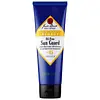What's inside
What's inside
 Key Ingredients
Key Ingredients

 Benefits
Benefits

 Concerns
Concerns

 Ingredients Side-by-side
Ingredients Side-by-side

Butyl Methoxydibenzoylmethane 3%
UV AbsorberHomosalate 10%
Skin ConditioningEthylhexyl Salicylate 5%
UV AbsorberOctocrylene 8%
UV AbsorberWater
Skin ConditioningBeeswax
Emulsion StabilisingAloe Barbadensis Leaf Juice
Skin ConditioningIsopropyl Palmitate
EmollientCetearyl Alcohol
EmollientCyclopentasiloxane
EmollientCyclohexasiloxane
EmollientCeteareth-20
CleansingHydroxyacetophenone
AntioxidantCarbomer
Emulsion StabilisingBenzyl Alcohol
PerfumingSaccharide Isomerate
HumectantPhenoxyethanol
PreservativeSodium Stearoyl Glutamate
CleansingTriethanolamine
BufferingTocopheryl Acetate
AntioxidantSodium Chloride
MaskingCitric Acid
BufferingButyl Methoxydibenzoylmethane 3%, Homosalate 10%, Ethylhexyl Salicylate 5%, Octocrylene 8%, Water, Beeswax, Aloe Barbadensis Leaf Juice, Isopropyl Palmitate, Cetearyl Alcohol, Cyclopentasiloxane, Cyclohexasiloxane, Ceteareth-20, Hydroxyacetophenone, Carbomer, Benzyl Alcohol, Saccharide Isomerate, Phenoxyethanol, Sodium Stearoyl Glutamate, Triethanolamine, Tocopheryl Acetate, Sodium Chloride, Citric Acid
Zinc Oxide 8%
Cosmetic ColorantEthylhexyl Methoxycinnamate 7.5%
UV AbsorberEthylhexyl Salicylate 3%
UV AbsorberArtemisia Umbelliformis Extract
Skin ConditioningAscorbyl Palmitate
AntioxidantBuddleja Davidii Leaf Extract
Skin ConditioningButylene Glycol
HumectantCalendula Officinalis Flower Extract
MaskingCyclopentasiloxane
EmollientDimethicone
EmollientDimethicone/PEG-10/15 Crosspolymer
Dimethicone/Vinyl Dimethicone Crosspolymer
Skin ConditioningEthylhexyl Isononanoate
EmollientIodopropynyl Butylcarbamate
PreservativeLauryl PEG-9 Polydimethylsiloxyethyl Dimethicone
Skin ConditioningLeontopodium Alpinum Extract
Skin ConditioningPeucedanum Ostruthium Leaf Extract
Skin ConditioningPhenoxyethanol
PreservativeRetinyl Palmitate
Skin ConditioningSodium Chloride
MaskingTriethoxycaprylylsilane
Water
Skin ConditioningZinc Oxide 8%, Ethylhexyl Methoxycinnamate 7.5%, Ethylhexyl Salicylate 3%, Artemisia Umbelliformis Extract, Ascorbyl Palmitate, Buddleja Davidii Leaf Extract, Butylene Glycol, Calendula Officinalis Flower Extract, Cyclopentasiloxane, Dimethicone, Dimethicone/PEG-10/15 Crosspolymer, Dimethicone/Vinyl Dimethicone Crosspolymer, Ethylhexyl Isononanoate, Iodopropynyl Butylcarbamate, Lauryl PEG-9 Polydimethylsiloxyethyl Dimethicone, Leontopodium Alpinum Extract, Peucedanum Ostruthium Leaf Extract, Phenoxyethanol, Retinyl Palmitate, Sodium Chloride, Triethoxycaprylylsilane, Water
Ingredients Explained
These ingredients are found in both products.
Ingredients higher up in an ingredient list are typically present in a larger amount.
Cyclopentasiloxane, or D5, is a silicone used to improve texture of products and trap moisture.
D5 is considered lightweight and volatile. Volatile means it evaporates quickly after application. Once evaporated, D5 leaves a thin barrier that helps keep skin hydrated.
It is also an emollient. Emollients help soften the skin and prevent water loss. Silicones create a silky texture in products. D5 helps other ingredients become more spreadable.
Studies show D5 is safe to use in skincare products. We recommend speaking with a skincare professional if you have concerns.
Learn more about CyclopentasiloxaneEthylhexyl Salicylate is an organic compound used to block UV rays. It primarily absorbs UVB rays but offers a small amount of UVA protection as well.
Commonly found in sunscreens, Ethylhexyl Salicylate is created from salicylic acid and 2-ethylhexanol. You might know salicylic acid as the effective acne fighter ingredient and BHA.
The ethylhexanol in this ingredient is a fatty alcohol and helps hydrate your skin, similar to oils. It is an emollient, which means it traps moisture into the skin.
According to manufacturers, Ethylhexyl Salicylate absorbs UV wavelength of 295-315 nm, with a peak absorption at 307-310 nm. UVA rays are linked to long term skin damage, such as hyperpigmentation. UVB rays emit more energy and are capable of damaging our DNA. UVB rays cause sunburn.
Learn more about Ethylhexyl SalicylatePhenoxyethanol is a preservative that has germicide, antimicrobial, and aromatic properties. Studies show that phenoxyethanol can prevent microbial growth. By itself, it has a scent that is similar to that of a rose.
It's often used in formulations along with Caprylyl Glycol to preserve the shelf life of products.
Chances are, you eat sodium chloride every day. Sodium Chloride is also known as table salt.
This ingredient has many purposes in skincare: thickener, emulsifier, and exfoliator.
You'll most likely find this ingredient in cleansers where it is used to create a gel-like texture. As an emulsifier, it also prevents ingredients from separating.
There is much debate on whether this ingredient is comedogenic. The short answer - comedogenic ratings don't tell the whole story. Learn more about comegodenic ratings here.
The concensus about this ingredient causing acne seems to be divided. Research is needed to understand if this ingredient does cause acne.
Scrubs may use salt as the primary exfoliating ingredient.
Learn more about Sodium ChlorideWater. It's the most common cosmetic ingredient of all. You'll usually see it at the top of ingredient lists, meaning that it makes up the largest part of the product.
So why is it so popular? Water most often acts as a solvent - this means that it helps dissolve other ingredients into the formulation.
You'll also recognize water as that liquid we all need to stay alive. If you see this, drink a glass of water. Stay hydrated!
Learn more about Water